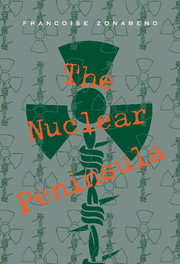Book contents
- Frontmatter
- Contents
- List of illustrations
- Preface: Once there was a landscape …
- List of abbreviations
- Introduction: Talking nuclear
- Part I Nuclear landscapes
- Part II The nuclear people
- 4 The nuclear site: an inventory of fixtures
- 5 Learning the nuclear ropes
- 6 The nuclear everyday
- Conclusion: The ultimate subject: man
- Notes
- Index
5 - Learning the nuclear ropes
Published online by Cambridge University Press: 15 January 2010
- Frontmatter
- Contents
- List of illustrations
- Preface: Once there was a landscape …
- List of abbreviations
- Introduction: Talking nuclear
- Part I Nuclear landscapes
- Part II The nuclear people
- 4 The nuclear site: an inventory of fixtures
- 5 Learning the nuclear ropes
- 6 The nuclear everyday
- Conclusion: The ultimate subject: man
- Notes
- Index
Summary
The special nature of work in a nuclear environment and the activities peculiar to the la Hague plant form the subject of a training course that is compulsory for everyone who is required to work on the site for longer than a month, whether employed directly by the plant or by one of the outside firms. Other specialised courses are available to COGEMA staff during their careers or when they are first taken on, because the very special nature of the operations involved in reprocessing means that it is impossible to use technicians coming straight from the state educational system. It is therefore essential, once staff with a particular level of technical qualification have been recruited, that they be given specific training. Hence the numerous training cycles that staff at the plant may pursue.
However, the one that is actually called the stage de formation or ‘training course’ is the only one that, at least so far as its theoretical content is concerned, is followed by all personnel present on the site, with the sole exception of management engineers, who do not require any additional instruction. The training course thus constitutes an apprenticeship in nuclear safety and in the industrial operations performed on the site that is shared by all administrative and skilled personnel, a presentation of a form of knowledge concerning matters nuclear that they all have in common.
- Type
- Chapter
- Information
- The Nuclear Peninsula , pp. 86 - 100Publisher: Cambridge University PressPrint publication year: 1993

